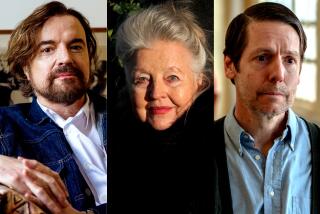Mary Wickes: Woman Who Came to Dinner : The veteran character actress made her debut pushing a wheelchair in ‘The Man Who Came to Dinner.’ Now she appears on ABC’s ‘Father Dowling.’
- Share via
Watching the veteran character actor Henry Jones function as a lightening, leavening pause for amusement amid the very dark doings of “The Grifters” the other day, I was reminded once again that supporting players still are, as they have always been, central to the success of movies and now of television.
Reviews and history may focus first and most heavily on the stars. And yet without Peter Lorre, Sidney Greenstreet, Elisha Cook Jr. and Mary Astor, Humphrey Bogart would have had to breathe heavily to keep “The Maltese Falcon” flying. It hardly diminishes Bogart to say that, or to add that the presences of Claude Rains, Paul Henreid, Conrad Veidt, Dooley Wilson and S. Z. (Cuddles) Sakall crucially helped “Casablanca” to its classic status.
The supporting players--the character actors--are thankfully still with us, villainous, laughable, sympathetic, veterans and newcomers, sometimes recognizable, sometimes vividly anonymous. One of the veterans, Mary Wickes, is at 74 presently enlivening the “Father Dowling” television series, just renewed on ABC.
The name may or may not instantly ring a bell, but the face evokes responses that tend toward, “Oh, sure, her . Wonderful. Remember her from . . . .” The from could begin with “The Man Who Came to Dinner,” in which she played nurse to Monte Woolley as the tyrannical guest. She did the play on Broadway before she came to Hollywood to make her film debut in it in 1942.
On the big screen, she was most recently Shirley MacLaine’s outspoken mother and Meryl Streep’s grandmother in “Postcards From the Edge,” a delicious enlarged cameo that was characteristic of the film’s high polish.
Her credits range from films as various as “Now Voyager,” “The Music Man” and “Napoleon and Samantha,” and before now she has been a regular on such television series as “Doc” and Ronald Colman’s “The Halls of Ivy.”
She has been the wisecracking comedic nurse or maid more often than she can count. For a time earlier in her career it seemed that she had found a whole career pushing wheelchairs. “I pushed and pushed Monte,” Wickes said over a splendid high tea a few afternoons ago. “And after that I pushed Clifton Webb and Edward Everett Horton and Orson Welles when we did a Hallmark version of ‘The Man Who Came to Dinner.’ ”
The roles have evidently left her with a sympathy for hospital patients. “There are never enough hangers in hospital closets,” she says. So she led a successful drive to get permanent hangers installed in the rooms at UCLA. At Denver General Hospital (“Father Dowling” was filmed in Denver its first two years), she found the lobby so drably depressing that she persuaded the hospital to let the Art Students League do a mural.
She talks a wonderful blue streak, offering a dazzling pastiche of great names (doing stock with Ina Claire and Ethel Barrymore at Stockbridge in the Berkshires) and titles (learning Indian club routines from an Olympic champion in that now lost sport for a role in George Cukor’s “The Actress”).
Occasionally a whole anecdote out of the ever-anecdotal world of theater emerges. Moss Hart, she remembers, was being hotly pursued by a young actress whose name for purposes of the story was Judy Smith. All of Hart’s friends knew the pursuit was in vain because Hart’s heart already belonged to Kitty Carlisle. But the actress persisted and one night she and Hart entered Sardi’s restaurant together. “Ah,” said an observing wag, “here come Moss Hart and the future Judy Smith.”
For years, continuing to do plays in New York, Wickes commuted to Hollywood, and decided a relatively few years ago that Los Angeles made more sense. She now lives in Century City in an apartment which includes her great-great-great grandmother’s wedding furniture. Her g-g-g-grandfather was a U.S. Supreme Court justice who wrote a dissenting opinion on the Dred Scott decision. “Good for him,” she says.
Wickes was born Mary Isabelle Wickenhauser (“How’s that for a handful?”) in St. Louis. She attended Washington University and briefly pondered going on to law school. She was graduated at a precocious 18, and the stage had already beckoned.
She had a small part in a St. Louis Little Theater production of “The Solid South,” which starred Richard Bennett, when she was seen and invited to join the company at the Berkshire Playhouse. “No guarantees about what I’d do, if anything.” In fact, she appeared in all 10 plays that season and, as the saying goes, was off to the races.
At 74 she continues to be a trouper, living to act. The other day on the set, she reports: “I tripped on a cable that hadn’t been there before and made a perfect three-point landing on my nose and knees. Did anyone ask me if I could go on? Certainly not. There was an air date. I got home at midnight.
“I love tradition. I hate the lack of discipline I find in some young actors. I hate people who keep wanting to change lines for their own convenience.”
Wickes has constructed a one-woman show of work by woman humorists, including Dorothy Parker and Ruth Draper. She has performed it at an American Conservatory Theater benefit in San Francisco and in Ojai but, so far, not in Los Angeles. It sounds like a natural to me and I hope some impresario will agree.
More to Read
Only good movies
Get the Indie Focus newsletter, Mark Olsen's weekly guide to the world of cinema.
You may occasionally receive promotional content from the Los Angeles Times.










